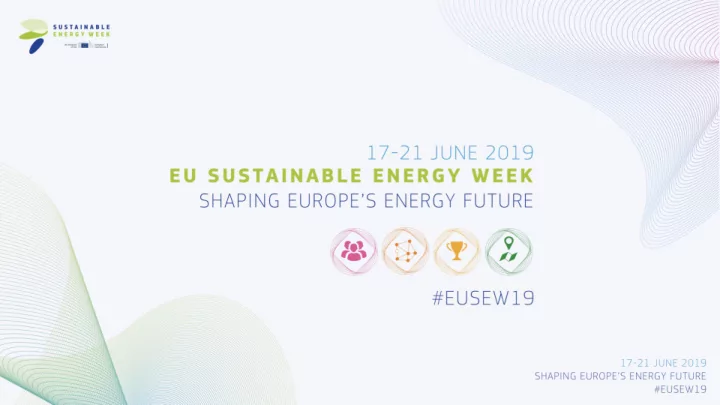

Urban Agenda Partnership on Energy Transition (UAETP) Brussels 19 June 2019
Partners of the UAETP 4 th UAETP Partnership Meeting CENER National Renewable Energy Centre Navarra (Spain) May 2018
Partners of the UAETP • Coordinators Gdansk (Poland) Greater London Authority (UK) Roeselare (Belgium)
Purpose/context of the UAETP • Urban Agenda established in the Pact of Amsterdam (Dutch Presidency 2016) • Objective: Effective urban policy and incorporating cities in both policymaking and the implementation processes • 70% of European citizens live in cities • How? Better funding / better knowledge / better regulation
Process & meetings Gdansk Tilburg London Pamplona Brussels Partnership (PL) (NL) (UK) (ES) (BE) Meetings Sept Dec Feb May Jan 2017 2017 2018 2018 2019 Presentation of UDG Informal Meeting Draft Action Plan Bucharest (RO) March 2019 Approval of DG UM Ministerial Meeting Final Action Plan Bucharest (RO) May 2019
Overall Vision • Security and resilience • Affordability, fairness and equitability • Clean and sustainable energy
“ Urban areas generate the majority of our energy demand and are the place where most of our carbon emissions are produced” “The objective is to create a far smarter and more integrated energy system , from a European down to a local level, that is zero carbon and demand led”
3 Working Groups WG1: WG2: WG3: Energy supply, Energy Consumers & generation & Consumption Masterplanning storage and management
The Action Plan & Actions
Action 1: Financing for district energy Required Action: • Identify and bring together key experts on district energy and financing • Share experiences and better define risks and opportunities • Develop paper of recommendations on improving financial support and present to European Commission’s DG ENER • Explore potential for collaboration with Energy Efficiency Financial Institutions Group
Action 2: Maximising use of waste heat Required Action: • Promote the inclusion of waste heat into future heat networks • Investigate the barriers to its limited use and suggest incentives • Creation of Working Group to run expert workshops • Draft position paper • Dissemination of outcomes and recommendations
Action 3: Energy masterplanning Required Action: • Update the regulatory framework to take into account new technologies • Draft guidance and recommendations for cities in developing energy masterplans • Dissemination of the outcomes via “Reference Framework for Sustainable Cities”
Action 4: Energy efficiency Required Action: • Creation, promotion and dissemination of “Deployment Desks” • Which possess both technical and administrative skills • Draft operational guidelines on Public Master Plans for building renovation • Explore EU funding instruments to promote retrofitting activities
Action 5: Funding Required Action: • Make the case for a dedicated EU fund for large-scale energy transition investments in urban areas • Explore multiple usage of EIB funding and synergies with EFSI & InvestEU funds
Public consultation process: Key findings Country of origin of respondents 4 February – 4 March 2019 • 16 entries/23 separate comments • 3 individuals • 11 organisations • 2 anonymous
Panel discussions Reflection on the Actions & concrete examples
Cities in the Energy Transition Jens Bartholmes European Commission Directorate-General for Energy Smart Cities and Communities
Discussion/Q&A with Audiance 1. What are the major challenges / threats of the energy transition process (max two words)?
Discussion/Q&A with Audience 2. Who is / shall be (mainly) responsible for the energy transition? a) EU administration b b) states c) Regions d) cities e) citizens f) companies g g) UN h) other
Discussion/Q&A with Audience 3. How can we assure the transition happens? a) EU legal regulations b) National legal regulations c) Local legal regulations d) Major financial flows e) Knowledge exchange f) Education and learning g) Other
Discussion/Q&A with Audience 4. What are the key (measurable: qualitative and quantitative) indicators/ milestones of the transition process (max two words)?
Recommend
More recommend